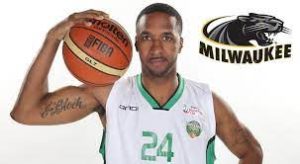The average NBA career lasts roughly 4.5 years but Clay Tucker showed that you can have a LOOOOOONG pro basketball career if you are simply willing to work hard. After leading Milwaukee to its 1st-ever NCAA tourney appearance in 2003, he did not get drafted that June…but that was just the beginning (rather than the end) of his pro career. He played in the ABA, the D-League, and all over Europe, allowing him to spend 15 years making money while playing basketball. After retiring he became a coach at his high school alma mater, giving him the chance to share a decade and a half of valuable knowledge with the next generation. HoopsHD’s Jon Teitel got to chat with Clay about making it to the NCAA tourney and almost going undefeated.
You were born/raised in Ohio: what made you choose Milwaukee? My mom had 3 sisters living in Milwaukee and I just fell in love with everything there during my visit: it felt like my 2nd home.
You played for a pair of great coaches in Bo Ryan/Bruce Pearl: what was the most important thing that you ever learned from either of them? The 1 thing I learned from both of them was the importance of being patient. They were big on all of the little details because that is what wins ball games.
In the 2003 Horizon tourney title game you had a win over Butler en route to being named tourney MVP: how were you able to play your best when it mattered the most, and how big a deal was it to make the 1st NCAA tourney appearance in school history? It was huge to lead that team to the 1st conference championship in school history. We had a heck of a group including 4 guys who scored 1000+ PTS in their career. It is a memory I will hold for the rest of my life.
In the 2003 NCAA tourney you scored 18 PTS but Dylan Page’s shot at the buzzer rolled off the rim in a 1-PT loss to Notre Dame: did you think that his shot was going in, and where does that rank among the most devastating losses of your career? I definitely thought the shot was going in because Dylan was very efficient around the basket. It is probably the most devastating loss in my entire career.
You remain atop the school’s leaderboard in several stat categories with 1788 PTS/194 STL/264 3PM: how were you able to balance all of the different aspects of your game? I was taught from a young age to be an all-around player rather than just focus on 1 aspect of the game. If I had an off-night scoring I wanted to be able to do other things to help my team win.
You were a finance major: how did you balance your work on the court with your work in the classroom? It was tough. I originally wanted to be a physical therapist but after taking a lot of difficult classes I switched to business. I was good at math so classes like statistics were pretty easy for me.
You spent 15 years playing pro basketball in the US/Europe for about 20 different teams: what is the biggest difference between basketball in the US vs. basketball overseas? European leagues are more physical. There are also different rules in the US like defensive 3 seconds, which means that you have to think about different ways to score.
In 2005 as a member of the Utah Snowbears in the ABA you scored more than 20 PPG and went 27-1: how close did you come to going undefeated, and what was your reaction like when you learned that your franchise was shutting down just days before the championship round? It was very devastating to hear that we could not keep playing after having such a great season. I had never worked harder in the preseason and then we went out and won about 26 games in a row during the regular season. We lost to Arkansas but then beat them in the next game. Arkansas wound up winning the title: it was tough to accept that because we had already beaten them.
In 2008 you were the top scorer in the Italian League: what is the secret to being a great scorer? You have to be ready to shoot at all times because you never know when you will get the ball. You also need to have confidence that every shot you take will go in.
You are currently the head coach at your former high school: how do you like being a coach, and what do you hope to do in the future? I love being a coach and giving back a lot of knowledge that I have gained over the years to the younger generation. I want to keep coaching kids who are very receptive and want to learn from me.

